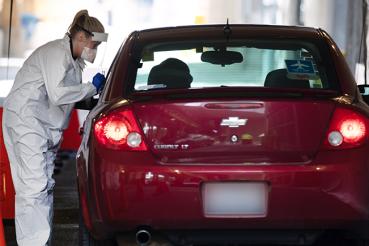COVID-19, RSV and the flu are expected to overlap this winter, but for the first time, there are vaccines to protect against all three.
Along with the annual updated flu vaccine, new COVID-19 vaccines are designed to better protect against more recent strains of the SARS-CoV-2 virus. The CDC recommends everyone age 6 months and older get both shots.
Also new this year: Infants and older adults can be protected against RSV, one of the most common viruses and one that causes a significant number of hospitalizations among vulnerable adults and very young children. It can be deadly.
Here’s what you need to know about this year’s respiratory viruses and vaccine options.
COVID-19 is still here
Cases of COVID-19 started to creep up earlier this fall for the first time in several months, and the virus is likely to spread as more activities move indoors.
“COVID-19 never left us,” said John Segreti, MD, hospital epidemiologist. “We’ve continued to see cases in Chicago and at RUSH, but fortunately there has been no spike in cases or hospitalizations since the omicron variant arrived.”
Now, new vaccines tailored to better combat more recent variants have been approved by the FDA and the CDC. The boosters from Pfizer and Moderna replace the previous versions of the COVID-19 vaccine, and they are being administered at pharmacies, local health departments, health clinics, some doctor’s offices and other vaccine distribution sites nationwide. The shot is expected to be covered by insurance, Medicare and Medicaid, and federal and local agencies are working on ways to provide the vaccine to the uninsured.
SARS-CoV-2, the virus that causes COVID-19, has mutated several times over since it first appeared in late 2019. A new strain called the Delta variant appeared in mid-2021, but it was overtaken quickly by the fast-spreading omicron variant.
Omicron itself continues to change, which is why the new boosters by Moderna and Pfizer are designed to target a relatively new omicron subvariant called XBB.1.5. Even newer subvariants have emerged in some parts of the world while the vaccine was being developed, with one, BA.2.86, having a high number of mutations. BA.2.86 is in a few nations, including the U.S. where it currently has been found in human and wastewater samples in nine states, and not, so far, in Illinois. Yet, even for these new variants, the booster is expected to be protective against severe disease, hospitalization and death.
“I’m telling my patients to get the new vaccine. If they sat out the last booster, their levels of protection are quite low,” said infectious disease physician Beverly Sha, MD, whose research includes COVID-19 vaccine clinical trials at RUSH. “With a newer vaccine that addresses newer variants, there’s even more reason to get it now.”
Some patients are still concerned about safety, Sha added. “But it is really like the flu vaccine model: Everything is the same but the variant, so all of the safety data, from billions of doses, tells us these vaccines are very safe.”
The annual flu vaccine addresses egg allergies
Influenza is a highly contagious respiratory virus that kills tens of thousands of Americans each year and hundreds of thousands worldwide — even with annually updated flu vaccines. Like SARS-CoV-2, the influenza viruses continually mutate, and so, each year, ahead of the fall/winter flu season, a vaccine targeted to the newest strains is developed and distributed.
The flu vaccine is most commonly given as a shot in the arm, but it also can be administered with a nasal spray to healthy people who are ages 2 to 49, excluding pregnant women, who should get the shot. The vaccine is available at pharmacies, doctors’ offices, health clinics and some workplaces.
This season, people with egg allergies can get the flu vaccine without taking extra precautions, whether the vaccine contains egg product or not, the CDC said. Before this year, those with egg allergies were advised to use a version of the vaccine that didn’t contain any egg product or get vaccinated in a medical setting.
Game-changing protection against RSV
One of the most common respiratory viruses went unnoticed by most people for years, until last winter, when a surge in cases contributed to children’s hospital beds being filled across the country. Yet RSV, short for respiratory syncytial virus, affects people of all ages, and it is the leading cause of lower respiratory tract infections, such as bronchiolitis and pneumonia.
RSV is so common that nearly all children will have it before they are 2 years old, and they will have it repeatedly throughout their lifetime. The first case is usually the most severe. In the great majority of cases, especially among adults, RSV does not cause major illness, and the symptoms may mimic a cold. But RSV can be more severe in infants, older adults and people who have asthma, heart and lung disease, compromised immunity and other health conditions or are living in a long-term care facility.
After years of work to develop protections against the virus for young and old alike, new options are available. For infants, whose tiny airways are easily distressed, a preventive medication called nirsevimab is recommended by the CDC to protect all babies under 8 months old and some children under age 2 who are at higher risk from RSV. While not a vaccine, nirsevimab works similarly by producing protective antibodies before an infection occurs, said pediatric infectious disease specialist Colleen Nash, MD, MPH.
“This is an exciting new option that is expected to lessen RSV-related hospitalizations and office visits for infants,” Nash added.
Earlier this year, the first vaccine for RSV was approved. The CDC recommends it for some adults over age 60, and for pregnant women, so that their infant will be born with protection from the virus. While the monoclonal antibody medication and the vaccine for pregnant women are broadly recommended, the CDC said some people age 60 and older should get the RSV vaccine, based on their risk factors and a discussion with their physician.
The combination of vaccines and the preventive medications is expected to greatly reduce the threat of RSV infections, said Mariam Aziz, MD, who is leading a long-term clinical trial at RUSH for another type of RSV vaccine. The protections have been decades in the making, she added.
“These will be game changers,” she said.
Learn what other facts RUSH experts have shared about the current vaccines and viruses and how they are watching out for future threats:




